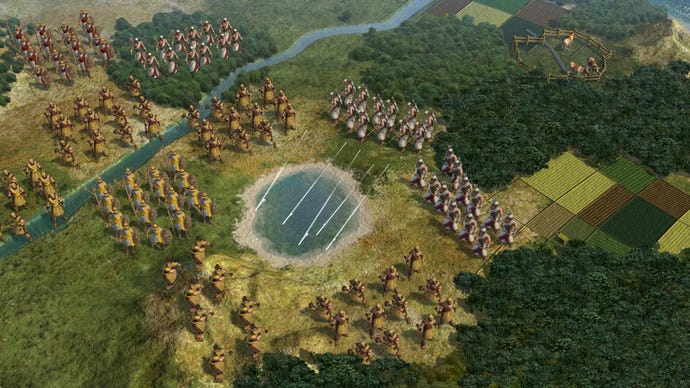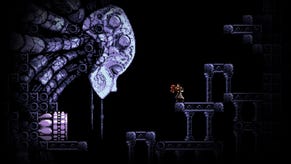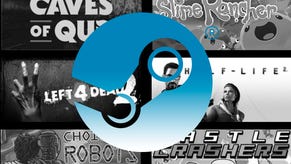The Life of a Porting House
Eurogamer's Richard Moss delves into the wild world of Mac gaming.
This article first appeared on USgamer, a partner publication of VG247. Some content, such as this article, has been migrated to VG247 for posterity after USgamer's closure - but it has not been edited or further vetted by the VG247 team.
It's a strange life, porting video games from one platform to another, seldom making something of your own.
But that's what Aspyr Media has been doing for roughly 17 years. They take a popular PC or console game -- BioShock Infinite is the latest one -- and develop and publish a Mac version, historically released months or years later (though that's not often the case now), earning ridicule and celebration from a frustrated audience long condemned to second-class treatment.
Except these days they're actually doing a pretty good job. Aspyr gets Borderlands 2 and Civilization 5 downloadable content and expansions out day-and-date with the PC version, and they also get most updates for all games in their catalog out on the same day as the PC, while the initial release of BioShock Infinite was five months late. "We aggressively try to be day and date now," says vice president of publishing Elizabeth Howard. "It's a priority for us."
"If it's coming from a Steam PC title, we're going to try to do as best we can to make that 100 per cent in parity with the PC," she continues. "We do everything we can to keep in sync with the PC so if there's a multiplayer [mode] our players are able to play with their PC friends."
If a game is late, it means either there were significant technical hurdles to overcome -- DirectX 11 posed problems with the BioShock Infinite port, for instance -- or they had to wait until the last minute for source code or publisher/developer approvals.
"There are nuances to creating content on the Mac, which include getting approvals from our partners," Howard explains. "It's just not as straightforward as 'we make a thing and then push it out.'"

They worked very hard to get this far, to build relationships with big companies like Activision and 2K, and to cut down the porting process enough that day-and-date releases are possible. But it took a long time, and it's somewhat remarkable that they survived at all in a small market that underwent several seismic shifts in a mere decade and still struggles to shake its reputation as being anti-games.
Both Apple and the Mac are in great shape today; they rake in squillons of dollars every year in profits and command enough attention to be taken seriously by companies large and small. But in 1996, when Aspyr entered the ring, Apple was in serious trouble. They were going broke, Mac market share had waned to barely 1 per cent of computers worldwide, and most developers couldn't get away from the seemingly doomed platform fast enough. But Aspyr's founders saw an opportunity to own the market for Mac games -- to become a big fish in a small pond -- and the gamble paid off handsomely when a Steve Jobs-rejuvenated Apple bounced back from the brink to form new multi-billion dollar markets in mobile hardware and digital media sales -- dragging the Mac along for the ride.
"It's changed immensely over the last 11 years," says Howard of her time with Aspyr. When she started, the iPod didn't exist yet -- let alone the iPhone, the iTunes Store, or the iPad -- and Macs were still using PowerPC architecture rather than the Intel processors of today. Retail distribution remained king of software sales, but Mac gaming boxes were being increasingly squeezed out of even specialist Apple stores.
Competing porting labels MacSoft and MacPlay soon fell by the wayside, but Aspyr survived both the fall of retail and the transition to Intel -- which was expected to kill Mac gaming because everyone thought "why not just Boot Camp into Windows?" Digital distribution picked up, both direct from publishers and through online storefronts like Mac Game Store, then Valve announced Steam for Mac in early 2010 and Apple launched the Mac App Store in January 2011. "It was a big year for us," Howard says. "In a matter of six months [or so] we went from virtually zero distribution -- because Apple had wound retail down to very limited box distribution -- to having two major outlets to sell content."
Steam put Mac gaming on the map, but embracing it took a bit of a leap of faith for porting companies like Aspyr. Its big feature was SteamPlay: buy once, play on all platforms that support the game, and if there's multiplayer it will be cross-platform. Your money goes into the kitty for whichever platform you mostly play it on around the time of purchase. "It was something that when they first introduced the concept it really frightened us," Howard says. "But since we've been out there in the wild we've seen a lot of benefits from participating in SteamPlay and being in the Steam ecosystem."

It's not like on PC, though. Steam commands monopolistic levels of control over PC game sales, but on Mac things are more disparate. Aspyr holds four of the top 10 slots on the Mac App Store for highest-grossing games, which combined with Steam represents the bulk of their sales, while a few alternatives -- including direct-from-publisher sales -- each take a small but significant slice.
This means that anyone who wants to succeed with a game on the Mac needs to have at least two SKUs -- one that targets Steam, with all the community functions that entails, and one that meets the strict requirements for approval in the Mac App Store, which forbids reliance on any third-party (that is, non-Apple) software. Howard wrote a lengthy blog post in January explaining the intricacies of this, but at its core is one issue: Steam does a bunch of magic with multiplayer and achievements, and if you want the same features in the Mac App Store version you have to rewrite it all to use Game Center, which is starkly different in how it handles things like friends lists and player discovery.
Nobody's really sure whether Apple cares about Mac gaming. There are certainly people within Apple who do, and the company has got right behind gaming on iOS, but Howard shares the common concern that higher-ups might not consider it a priority. "I think the challenge with Apple is that they're such a big and successful company," she says, "and the focus for the company is on what's going to deliver success for its shareholders, which in this case is mostly the iPhone and the iPad." She believes that triple-A gaming is important to Mac owners, but she doubts that Apple has truly got the message.
That said, she explains that the improved quality of Aspyr's ports in recent years is in part due to a closer relationship with Apple. "We've been able to develop both a store-side relationship with them as well as develop our developer relationships," she says, "and we've definitely been working harder to bring issues to their attention and try to work closer with them on trying to improve the overall state of Mac gaming."
It's not only recent big triple-A games that get the porting treatment. Aspyr and London-based Feral Interactive (who declined requests for interview) both periodically release mid-tier or older stuff, like RollerCoaster Tycoon 3 or Sid Meier's Railroads!. Virtual Programming was doing the ports for smaller commercial titles such as Europa Universalis 3 until recently, but all signs point to them now running a support-only operation -- their website is barely more than a holding page and they've gone quiet on social media. Mac porting labels tend to last a long time, though -- MacSoft lasted over a decade and Feral is still going strong after 15 years -- and there's still room for smaller players. Like one-man shop Red Marble Games, which has ported indie and small commercial games for 10 years now.
"When I started Red Marble Games in 2003," says Mark Batten, "the Mac market was not only an afterthought -- it was a never-thought. It was surprisingly easy to approach companies making fun Windows games and convince them to let me do the Mac port." He's ported 65 games so far, including Democracy 2 and Gratuitous Tank Battles, even while juggling Red Marble with a day job as a lawyer. Batten is too risk averse to do porting full time, but he loves the opportunity to use a different part of his brain to dig into some coding. Where bigger porting houses like Aspyr have to worry about impatient and demanding fans who expect the next big thing to fall on their doorstep at the same time as PC gamers, Batten has little to worry about beyond doing a good job in a reasonable period of time. He loves the challenge of porting, and of figuring out code that doesn't always follow best practices.

"I had one developer who put almost the entire game into a single file, using plain C, and used variable names that were often single characters." Sometimes the technical side of porting is painful, he says, but mostly it's just a fun challenge.
For Aspyr, which handles games from the best talent in the business, handling someone else's code is the easiest part of the process. Engineering only becomes a real issue when it comes to new technology, like the DirectX 11 and BioShock Infinite example, or system updates. Apple now releases a major new version of OS X every year, plus four to six incremental updates, and sometimes that creates new bugs to fix. It also makes supporting older systems harder, because Apple update their tools, too.
Porting a triple-A game involves a lot more than just making the code run on a new platform, Howard explains. "We're sort of always in the process of re-educating people on what it means to publish on the Mac." Only 12 of Aspyr's 50 or so employees are in engineering, while "quite a few" are in quality assurance. Howard's publishing team has seven people. The non-engineering people have to tackle issues like scheduling, contract negotiations, publisher relationships, support for a full catalog of games, marketing, multiple stages of approval from rights holders, and all sorts of other things that happen almost entirely behind the scenes. Even handling the port for a sequel in the same series takes a new set of negotiations to get off the ground.
When a port is "late" it usually means that there was a hitch in the process of all this other stuff. They try very hard to avoid it, because they know it frustrates their audience -- and it's never a good idea to bite the hand that feeds you.
Howard strains to make clear that Aspyr's priorities lie in pleasing their customer base. Everyone at the company is a Mac gamer; they all want to raise the profile of gaming on the Mac, and the majority of them have been at this job for more than seven years. She loves her job and the respectful environment of her workplace. And constant exposure to the latest and greatest in the world of gaming doesn't hurt. "We get to be big fish, small pond," she says. "We get the best of all the cool stuff without all the hassle of being a giant conglomerate -- you know, a publicly traded company with lots of expectations of what we're delivering on a quarterly basis."
As for the future, Howard's tightlipped on the company's plans. Aspyr recently brought classic BioWare RPG Star Wars Knights of the Old Republic to iPad and iPhone, and there's a small team within the company dipping its toes into original development, but the focus at this point is still squarely on porting more awesome games to the Mac and on improving the way they communicate and engage with Mac gamers. "We really think that's how it should be done," she says.
They must be doing something right. Not many games companies can claim to be stronger than ever after 17 years at the gig.








